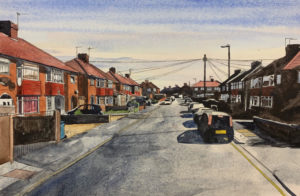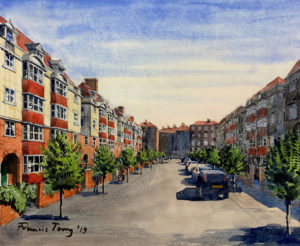This is what Milton Keynes will look like if we have our way (Photo by Hollie Latham/PhotoPlus Magazine/Future via Getty Images)

Yesterday saw the publication of Living with Beauty, the final report of the Government’s Building Better, Building Beautiful Commission. Readers of UnHerd will doubtless remember the eventful story of this Commission, from the initial controversy over Sir Roger Scruton’s appointment, through his dismissal and reappointment last summer, to his illness and death earlier this month.
I cannot exactly claim impartiality about these events — Scruton was my friend and mentor for many years, and I was his (and later Nicholas Boys Smith’s) research assistant on the Commission. But rather than retelling this story, I want to develop the case for one of the Commission’s proposals, one to which Scruton attached particular importance as a potential solution to our housing crisis.
Throughout his career, Scruton had been a champion of what is often called “traditional urbanism”, the urban form of the old cities of the world. Traditional urbanism is immediately recognisable, and contrasts sharply with the high-rise and suburbia of the twentieth century. It consists of terraced streets of about five storeys, made up either of tall, narrow houses, or of shops below and apartments above.
The most familiar British illustration of this is the Georgian or early Victorian terrace, but we find the same basic urban form recurring across an immense variety of climates, landscapes and architectural styles, from Lisbon to Istanbul, Aleppo to Stockholm. Cities built this way are now beloved by residents and visitors alike. And a wealth of empirical evidence shows that there is no way of building that makes us healthier and happier.
At least in its European variants, traditional urbanism was normally created by fairly simple planning systems. Property owners were allowed to build up to a height of five or six storeys, provided they respected codes governing the appearance and safety of the building The fact that people had to walk everywhere constrained the outward spread of cities, so when the population grew, it became economical to build up to those heights.
In the late nineteenth and twentieth centuries, the development of mechanised transport removed this constraint on building outwards, and cities spread out massively. The transition was effectively complete by the 1930s: the Georgian five-storey terrace had given way to the two-storey semi, which has remained the norm for private housebuilding ever since.
There are many downsides to this kind of development, such as the car-dependency and the sense of placelessness it engenders. But while space is abundant, it has one great argument in its favour: it allows everyone to have a spacious house and garden, which is genuinely popular.
Our situation, however, has changed. Constraints on the expansion of cities have returned in legal form, as resistance to building on fields has grown. So in many British cities, we are back in a situation curiously akin to that of our ancestors: growing populations, rising demand, and constraints on building outwards.
The solution might seem obvious: like our ancestors, we should build upwards. And this would indeed solve the problem: more than half of our housing stock is low-density suburbia, so converting it into traditional terraces would meet our housing needs many times over. Why aren’t we doing this?
The answer is that, during the time of abundant land, a new planning system was introduced that normally prevents homeowners from extending or replacing their properties as they could have done in the past. This arguably made sense when it was easy to provide new houses elsewhere, but today it has the effect of permanently locking in low-density suburbia — a kind of urbanism whose principal merit was that it gave everyone their own house, but which now stands in the way of that dream.
One effect of this system is that when a site is approved for more housing in high-cost areas, massive suppressed demand often shoots up in the form of high-rise, an unpopular housing type with demonstrable negative effects on the wellbeing of many inhabitants.
Should we go back to the old system, then? There is something to be said for this, but politically it out of the question. When one homeowner sells a 1970s semi to be redeveloped as two five-storey terraced houses, he or she becomes rich, but all the neighbours gain nothing and suffer the annoyance of having larger buildings constructed next door.
So although it would be in everyone’s interests to have development rights, it is also in everyone’s interests to oppose such rights for everyone else. This pattern has made even modest visible extensions to houses politically difficult, and universal development rights completely unrealistic.
The solution that Scruton and his colleagues proposed is to grant development rights not to individuals, but to local communities. They propose that we allow streets to hold a vote on whether to let homeowners redevelop their homes. If a two-thirds majority support it, homeowners would receive planning permission to add floors to their homes and to take up more of their plot area. The limits on what streets should be able to grant themselves would be those of traditional European cities: five-storey buildings in a terraced format.
Many streets would probably choose to go up to these limits in order to maximise the increase in property values. But if they prefered, streets could vote themselves more limited permissions, such as filling the gaps between detached houses, but not redeveloping as a whole. Because everyone on the street would benefit from the huge uplift in property values after such a vote, everyone would have an incentive to support it.


All redevelopment would be required to conform to a rigorous design code, also to be voted on by residents. This would ensure that the new streets could not be ruined by unscrupulous private developers or would-be iconic architects. New or restored buildings would also be required to meet high standards of energy efficiency. Permissions would be unavailable for listed buildings or buildings in conservation areas to safeguard architectural heritage. A hypothecated tax could be levied on the capital gains arising from a successful vote to fund the local infrastructure needed for a larger number of residents.
Who would benefit? The millions for whom the housing crisis has made home ownership impossible would gain immeasurably from the end of the shortage. Homeowners in streets that vote for densification would become wealthy at a stroke. Lovers of the traditional city would see the suburban mistakes of the twentieth century rectified, with traditional urbanism replacing suburban sprawl; lovers of the countryside would see falling pressure for greenfield development.
Carbon emissions would fall due to reductions in emissions from reduced car dependency and more sustainable housing typologies. High streets would benefit from more people living within walking distance of them. And everyone would benefit from economic growth and higher tax receipts to fund public services.
Who would lose? The most obvious group would be landowners and speculators, who would make somewhat smaller fortunes from selling land for housebuilding than they do at the moment. But maybe this is one of those rare cases where nearly everyone wins.
One of the leitmotifs in Scruton’s work is that the forms of life that communities gradually work out for themselves often contain more wisdom than anyone realised. In his last work, whose writing cost him so much, he returned again to this idea. I was not always persuaded by Scruton’s uses of this thought in other contexts, but here its importance is powerfully illustrated. In this case, maybe the way forward is indeed the way back — back to the traditional city, by reinventing the system under which it was created.









Join the discussion
Join like minded readers that support our journalism by becoming a paid subscriber
To join the discussion in the comments, become a paid subscriber.
Join like minded readers that support our journalism, read unlimited articles and enjoy other subscriber-only benefits.
Subscribe